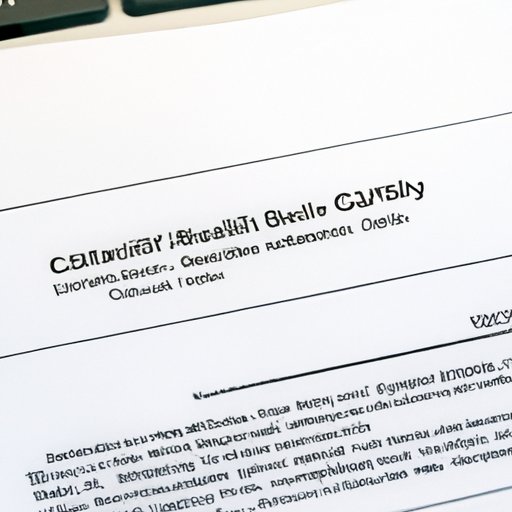Introduction
A birth certificate is a legal document that provides information about a person’s birth, including the date, location, and parentage. It may be necessary to obtain a new birth certificate for a variety of reasons, including lost or damaged documents, changes to personal information, or special circumstances such as adoption or citizenship. In this guide, we will provide a step-by-step overview of the process for obtaining a new birth certificate, including information on how to apply online or in-person, expedited service options, correction or amendment procedures, and special circumstances that may require additional steps.
Step-by-Step Guide
The first step in obtaining a new birth certificate is to gather the necessary documents. Most states require a government-issued photo ID, such as a driver’s license or passport, and proof of your relationship to the person named on the birth certificate if you are not the individual named on the certificate. You may also need additional documentation to prove your eligibility to request a new birth certificate, such as proof of residency or employment. Check with your state’s vital records department to determine the specific requirements.
Once you have gathered the necessary documents, contact your state’s vital records department to submit an application for a new birth certificate. The process for submitting an application may vary depending on the state and the method used, but the vital records department can provide detailed instructions.
Online Application
Many states offer the option to apply for a new birth certificate online. To apply online, you will typically need to provide personal information such as your name, date of birth, and parentage, as well as payment for any required fees. Online applications may be processed more quickly than in-person requests, but there may be additional fees for expedited service.
To submit an online application, visit your state’s vital records department website and follow the instructions provided. Be sure to double-check the accuracy of all information provided before submitting your application, as errors can cause delays or even rejection of your request.
In-Person Application
If you prefer to request a new birth certificate in-person, you will need to visit your state’s vital records office during regular business hours. You will typically need to provide the same documentation required for online applications, as well as any necessary fees. In-person requests may take longer to process than online requests, but there are fewer concerns about submitting accurate information since you can verify details in person.
When visiting the vital records office, be sure to bring valid identification and any documentation required by your state, such as proof of relationship or proof of residency. Follow the instructions provided by the staff at the office to submit your request and pay any necessary fees.
Expedited Service
If you need your new birth certificate quickly, you may be able to use expedited service options. Many states offer expedited processing for an additional fee, which can reduce waiting times significantly. Expedited service may be available for both online and in-person requests, and the fees charged may vary depending on the state and type of service requested.
To request expedited service, contact your state’s vital records department and inquire about the availability of this option. Be prepared to pay any additional fees and provide all required documentation as quickly as possible to ensure timely processing of your request.
Correction or Amendment
If you need to amend or correct information on your existing birth certificate, you will need to follow a different procedure than if you were requesting a new certificate entirely. This procedure may also vary by state, so be sure to check with your state’s vital records department for specific instructions.
The process for correcting or amending a birth certificate typically involves submitting a written request and providing supporting documentation to prove the requested changes. Necessary fees may also be required. It is important to follow all instructions provided and provide accurate documentation to avoid delays or rejection of your request.
Special Circumstances
Special circumstances may require different procedures or documentation to obtain a new birth certificate. For example, adoptees may need to provide additional documentation to prove their eligibility to request a new birth certificate, while individuals born overseas may need to provide proof of citizenship and residency. Contact your state’s vital records department for specific instructions and requirements for special circumstances.
Frequently Asked Questions (FAQs)
Here are some commonly asked questions and answers about obtaining a new birth certificate:
Q: Who is eligible to request a new birth certificate?
A: Generally, the individual named on the birth certificate or their immediate family members may request a new birth certificate. However, specific requirements may vary by state, so check with your state’s vital records department to determine eligibility.
Q: How much does it cost to get a new birth certificate?
A: The cost of a new birth certificate varies by state and method of application. Fees may also vary based on whether or not you request expedited service.
Q: How long does it take to get a new birth certificate?
A: Processing times for new birth certificates vary by state and method of application. Online requests may be processed more quickly than in-person requests, and expedited service options may be available for an additional fee.
Conclusion
Obtaining a new birth certificate can seem like a daunting task, but by following our step-by-step guide, you can navigate the process easily and efficiently. Whether you choose to apply online or in-person, or you need expedited service or correction/amendment procedures, our guide provides all the information you need to get a new birth certificate quickly and accurately. Remember to check with your state’s vital records department for specific instructions and requirements, and don’t hesitate to ask for assistance if you need it.
